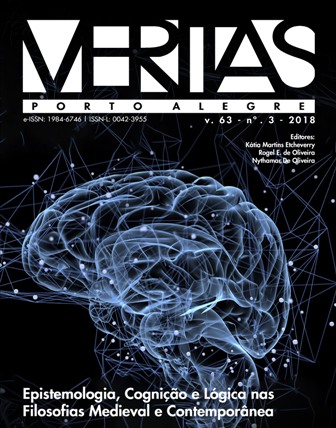Neuroscience and Mysticism: There is a possibility to think God?
DOI:
https://doi.org/10.15448/1984-6746.2018.3.30609Keywords:
Neurotheology, Emergentism, Mind, Brain, Neuroscience.Abstract
The article briefly presents the main theses regarding the mind and brain relationship in the context of strong and weak emergentisms. The main consequences of the discussion of a possible neurotheology for the understanding of the processes of hominization, freedom, limits of brain knowledge and knowledge of the brain, mind-brain-world relationship and “necessity” of the mystery generated by the brain dynamics.Downloads
References
CUNHA, E. Como nos tornámos humanos. Coimbra: Imprensa da Universidade de Coimbra, 2010. (Estado da Arte 4). DOI: https://doi.org/10.14195/978-989-26-0181-6
DAWKINS, R. Deus, um delírio. 7ª reimpressão. Tradução de F. Ravagnani. São Paulo: Companhia das Letras, 2007.
GUTIÉRREZ MARTÍNEZ, A. La conciencia: ¿problema o misterio? In: Studium. Revista cuatrimestral de filosofía y teología, vol. LI, Fasc. 3 (2011), p. 469-486. Madrid: Institutos Pontificios de Filosofía y Teología.
HEIDEGGER, M. Conceitos fundamentais da metafísica: mundo, finitude, solidão. Tradução de M. A. Casanova. Rio de Janeiro: Forense Universitária, 2003.KAKU, M. A física do futuro: como a ciência moldará o mundo nos próximos cem anos. Tradução de M. Carvalho e J. C. S. Duarte. Lisboa: Bizâncio, 2011.
LLAMAS, B. et alii. Ancient mitochondrial DNA provides high-resolution time scale of the peopling of the Americas. In: Science Advances, vol. 2, nº 4 (2016). DOI: https://doi.org/10.1126/sciadv.1501385
DOI: 10.1126/scadv.1501385
http://advances.sciencemag.org/content/2/4/e1501385. full.pdf+html Acesso em 20.05.2016.
MONOD, J. O acaso e a necessidade: ensaio sobre a filosofia natural da biologia moderna. 6ª edição. Tradução de B. Palma e P. P. S. Madureira. Petrópolis: Vozes, 2006.
MONTAIGNE, M. Ensaios. Tradução de S. Milliet. São Paulo: 34, 2016.
NEFFE, J. Einstein: uma biografia. Tradução de I. A. Lohbauer. Barueri: Novo Século, 2012.
NEWBERG, A., D’AQUILI, E. & RAUSE, V. 2015. Pourquoi « Dieu » ne disparaîtra pas : quand la science explique la religion. 2e édition. Traduit de l’anglais par K. D. Robert. France : Sully, 2015.
PUTNAM, H. A tripla corda: mente, corpo e mundo. Tradução de L. Teopisto. Lisboa: Instituto Piaget, 2002.
SEARLE, J. R. Liberdade e neurobiologia: reflexões sobre o livre-arbítrio, a linguagem e o poder político. Tradução de C. M. E. Morel. São Paulo: Unesp, 2007.
STEIN, E. Nas proximidades da antropologia: ensaios e conferências filosóficas. Ijuí: Unijuí, 2003.
STEIN, E. Antropologia filosófica: questões epistemológicas. 2ª edição revisada. Ijuí: Unijuí, 2010.
STRAUSS, A. et alii. The Oldest Case of Decapitation in the New World (Lapa do Santo, East-Central Brazil). In: Plos One (2015).
DOI: 10.1371/journal.pone.0137456, september 23, 2015. DOI: https://doi.org/10.1371/journal.pone.0137456
http://journals.plos.org/plosone/article?id=10.1371/journal.pone.0137456 Acesso em 23.05.2016.
Downloads
Published
How to Cite
Issue
Section
License
Copyright
The submission of originals to Revista Veritas implies the transfer by the authors of the right for publication. Authors retain copyright and grant the journal right of first publication. If the authors wish to include the same data into another publication, they must cite Revista Veritas as the site of original publication.
Creative Commons License
Except where otherwise specified, material published in this journal is licensed under a Creative Commons Attribution 4.0 International license, which allows unrestricted use, distribution and reproduction in any medium, provided the original publication is correctly cited. Copyright: © 2006-2020 EDIPUCRS</p






